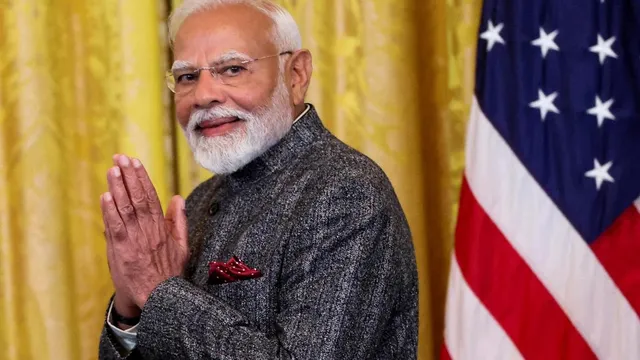
Modi vows to protect India’s dignity after military operations against Pakistan
2025-05-22 10:46- Prime Minister Narendra Modi spoke in Bikaner, focusing on national security and the bravery of the Indian Armed Forces.
- He highlighted recent military actions against terrorists linked to attacks in Kashmir, asserting India's commitment to punishing adversaries.
- The government's dual focus on security and development aims to foster a unified sense of national pride amidst ongoing tensions.
Express your sentiment!
Insights
In India, Prime Minister Narendra Modi addressed a significant gathering in Bikaner following a military operation named Operation Sindoor. The event took place on Thursday, May 22, 2025, focusing on the bravery of the Indian Armed Forces amidst tensions with Pakistan. Modi recalled his previous statement after the Balakot airstrikes in 2019, asserting that he would not allow the nation to be diminished or bowed down. His remarks were particularly poignant, given the recent military action, where Indian forces reportedly eliminated nine major terrorist hideouts in just 22 minutes in response to an April 22 attack that claimed the lives of tourists in Kashmir. Modi urged a sense of national pride and unity amidst these challenges, linking the current situation with India's historical courage, particularly referencing Rajasthan's valorous spirit. Furthermore, the Prime Minister highlighted the government's strategies to modernize infrastructure and boost development across the nation. He mentioned significant advancements in areas such as roads, airports, and railway stations, with infrastructure spending reportedly increasing sixfold over the last eleven years. These development efforts are being positioned as parallel to the nation's security initiatives, illustrating the government's comprehensive approach to safeguarding and advancing India's interests on multiple fronts. In a broader context, the Indian government has been actively pushing an anti-Pakistan narrative on international platforms, dispatching delegations to 32 countries to encourage greater criticism of Pakistan. Domestically, however, there has been a crackdown on dissent, with numerous Twitter accounts being suspended, including those belonging to journalists and media outlets, indicating a stringent management of public discourse during this turbulent period. The assertions made by Modi resonate in the backdrop of India's heightened military readiness and the government's intention to project a strong national image externally while addressing internal dissent. The juxtaposition of military action with infrastructure development highlights a dual focus aimed at reinforcing national pride and ensuring security simultaneously. As Modi concluded his rally, he reiterated his commitment to preserving the dignity and integrity of the nation, aiming to galvanize support and resolve among the Indian populace against external threats and internal discord.
Contexts
The historical context of India-Pakistan relations is complex and multifaceted, stemming from a long history of cultural, political, and territorial disputes. Following the end of British colonial rule in 1947, the subcontinent was divided into two sovereign states, India and Pakistan, based largely on religious lines. This partition led to one of the largest mass migrations in history, accompanied by widespread communal violence, resulting in the displacement of millions and the loss of countless lives. The lingering resentment from these traumatic events has continued to shape the relationship between the two nations, influencing their interactions in the decades that followed. At the core of the conflict between India and Pakistan are several key issues, most notably the territorial dispute over Jammu and Kashmir. Both nations claim the region in its entirety, but it remains divided, with India administering the largest portion. Military confrontations, most prominently in 1947-48 and in 1965, were driven by these territorial claims. The Kargil War in 1999 was another significant military conflict that underscored the volatile nature of their relationship. These conflicts have been accompanied by ongoing skirmishes along the Line of Control and a continuous arms race, which has included both conventional and nuclear capabilities, with both countries successfully testing nuclear weapons in 1998. In addition to military conflicts, the India-Pakistan relationship has been marred by cross-border terrorism. India has repeatedly accused Pakistan of supporting militant groups that carry out attacks within its territory. Major terrorist incidents such as the 2001 Indian Parliament attack and the 2008 Mumbai attacks have severely escalated tensions, leading to calls for more stringent military and diplomatic measures from India. Pakistan, on the other hand, has reshaped its narrative to portray itself as a victim of terrorism and blames India for destabilizing the region. This blame game has frequently undermined dialogue and peace initiatives, with both countries alternating between periods of thaw and renewed hostility. Despite the challenges, there have been numerous attempts to foster dialogue and normalize relations between India and Pakistan. Diplomatic initiatives, such as the Lahore Declaration in 1999 and various back-channel discussions, exemplify efforts to address core issues, promote trade, and encourage people-to-people connections. However, these initiatives have often been derailed by incidents of violence or political changes within either country. The relationship remains marked by a lack of trust, with domestic political considerations often impacting the willingness to engage in meaningful negotiations. As both nations navigate their complex historical context, the ongoing challenges will require a commitment to dialogue, reconciliation, and a recognition of shared interests for any sustainable resolution to emerge.